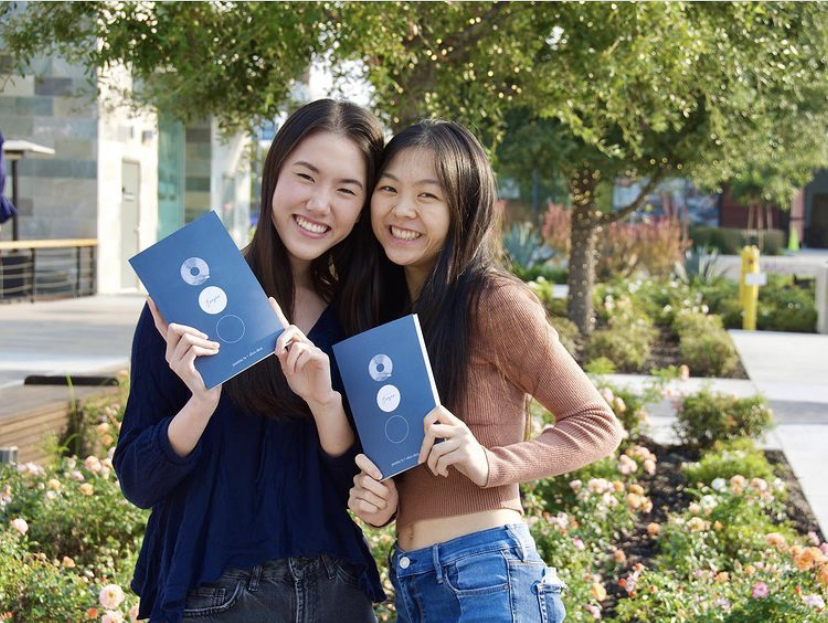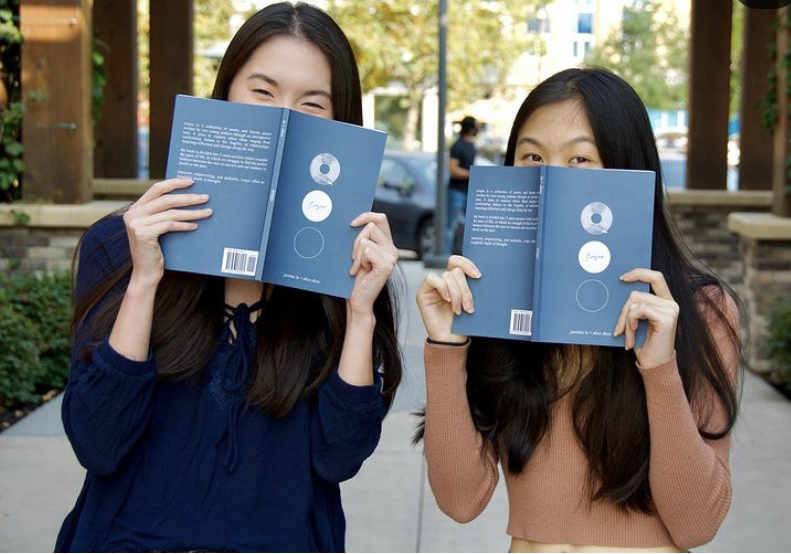Tempo: Two teenagers’ perspectives on the pace of life
Seniors Jasmine Lu and Alice Zhou release a collection of poetry and literary pieces on mental health and young adulthood
Photo by Forrest Leung | Used with permission
Lu and Zhou pose with their paperback versions of “Tempo.” A collection of these photos were posted on both Lu and Zhou’s Instagrams to promote the book.
January 5, 2021
Seniors Jasmine Lu and Alice Zhou recall discussing writing a book in their sophomore year in seventh period Sushma Bana’s Pre-Calculus Honors class. Following this conversation, the two had the idea in the back of their minds but only ended up executing it a year later, near the end of their junior year, officially releasing it on Sept. 27, 2020.
According to Zhou, the pair always knew that they wanted their book to be about their personal experiences, covering topics like happiness and relationships. They took inspiration for the book’s format from author and poet Rupi Kaur, who has written books like “The Sun and her Flowers.” Often, Kaur uses separate poems and literary pieces to connect to one overarching theme. Lu shares that because they chose this formatting style, the pair wrote most of the book separately.
“It’s just hard to write stuff like this together since it’s really personal,” Lu said. “You’re writing from your own thoughts, feelings and experiences. So [the writing process] was more individual and then we would go back and do iterations and edit.”
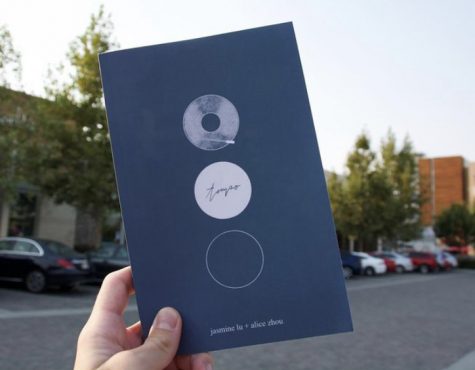
Their book, titled “Tempo,” consists of poems and literary pieces spanning several topics young adults face in their lives, with titles ranging from “self-image” and “it’s okay to not be okay” to “misjudgment” and “feeling heard.” Lu says that because of these distinct, heavy topics, coming up with the overarching theme that encapsulated them was “a lot of pressure.” However, the pair eventually decided on the name “Tempo,” defined in the book as “the rate of speed of a musical piece.”
“The entire theme of the book is ‘tempo’ — different rhythms of music,” Lu said. “That actually didn’t really come into our thoughts until at the end because we wanted to have a cohesive theme to tie everything together … [Eventually] [‘tempo’] came up, and we were like, ‘yeah we like that’ [because] we could incorporate that into different sections of [the] book, depending on the aura of each poem.”
As a result of this title, “Tempo” is split into five sections: grave (“very slow”), accelerando (“gradually faster”), allegro (“fast”), ritardando (“gradually slower”) and moderato (“moderate”), with an opening and closing piece titled “overture” and “coda.” The pair explains that the sections are placed in this order to resemble the pace of life. Pieces throughout these sections aim to promote vulnerability and comfort in one’s own skin. For example, the poem “self-image” follows Zhou’s struggles with her body image and relationship with food, beginning with the lines “i’m already questioning if this is the place to put my most vulnerable self out there.”
Zhou shares that the book-length poem “Citizen: An American Lyric” by Claudia Rankine, which she first read in Honors American Literature her junior year, inspired this vulnerability due to its exploration of “unconventional thoughts” and sharing the stories of “suppressed voices.” Zhou notes that her favorite section of “Tempo” is allegro, which reflects on attitudes towards relationships.
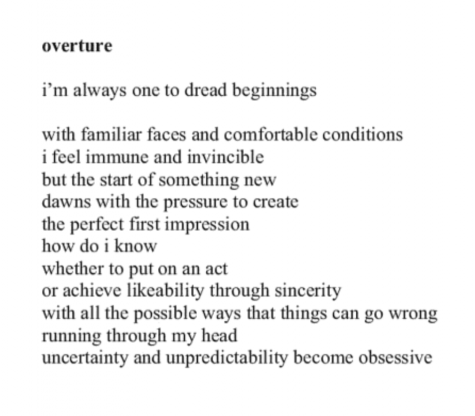
“[In the allegro section], we started off with the more serious part of relationships and how trust can be broken and there are times where relationships won’t work out like you want them to,” Zhou said. “But then we slowly transition into how you can protect these relationships and the people that [you] really care about. I think that taking the time to really appreciate those who will stay by you no matter what is really important — rather than choosing to always dwell on the broken relationships and the ones that didn’t work out in the first place.”
For Lu, her favorite section is moderato, as it is the final section where the distinct pieces throughout the book start to connect to their theme of finding balance between the “fast” (chasing the future) and “slow” (dwelling on the past) tempos and moments of life. She also highlights that this is where the pair begins to urge readers to reflect on the advice from these poems and take initiatives to create change within their own lives. Lu particularly cites the feminist tone poem “a new generation” as one that can be especially inspirational for other girls like her. The poem ends with the lines: “let’s start by telling girls … you are capable of anything you set your mind to.”
“[As girls], we’re often told that a lot of things aren’t possible,” Lu said. “If you doubt yourself at all, you’re kind of stuck in this hole and it’s a downward spiral, but [in ‘a new generation’], we [tell girls] that if you have an idea or you want to pursue something that you’re passionate about, there are tools and resources out there that can make your idea come to life. You shouldn’t let your ambition scare you.”
Since “Tempo” draws from the pair’s own personal experiences, Zhou shares that the writing process allowed her to reflect on her own emotional journeys, which at times proved difficult.
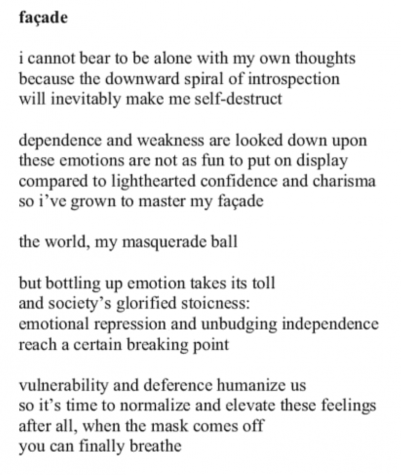
“I think that the book for me was a big learning process,” Zhou said. “Because we were trying to inspire and help other young adults, I wanted to end the piece or the poem with words of advice, but even I didn’t know what words of advice to give. So I thought I was really reflecting on my own experiences and thinking about ‘how can I make this simple not only for others but for myself?’ [and say], ‘I know there’s not an easy solution to any of this, but there‘s simple steps that you can take.’”
Senior Kelli Kosakura, a friend of both Lu and Zhou, first heard about “Tempo” through the pair’s promotional Instagram posts. She recalls that her first instinct was to buy “Tempo” to support her friends and notes that she was curious about what they would share in a book marketed as introspective and emotional.
“At first, I kind of had this judgment [that] they’re perfect human beings,” Kosakura said. “They do everything right. Everyone loves them [and] I hear nothing bad about them so for me hearing them talk about mental health, ‘I’m like, ‘I don’t know what they would talk about’ because to me they just seem like they never go through [these] struggles … But [while reading], it was just super relatable and it really caught me off guard.”
Kosakura shares that she found comfort in “Tempo” and felt that the pair promoted mindfulness and mental health, which she says is a necessary topic of conversation in the community. Lu echoes this sentiment, hoping that “Tempo” will inspire young adults at MVHS and in nearby communities to prioritize themselves and understand they’re not alone in facing struggles.
“We’re both part of the mental health club on campus, Bring Change to Mind,” Lu said. “[It’s] all about promoting emotional positivity, normalizing vulnerability and being open about your emotions, especially because there’s such a stigma surrounding it — mental health isn’t really talked about, even though it’s a prevalent, [yet] invisible problem in our community. [These feelings] inspired us to do our own part [through ‘Tempo’] in promoting vulnerability and really diving deep into our own thoughts and emotions, in hopes of encouraging others to do the same.”



